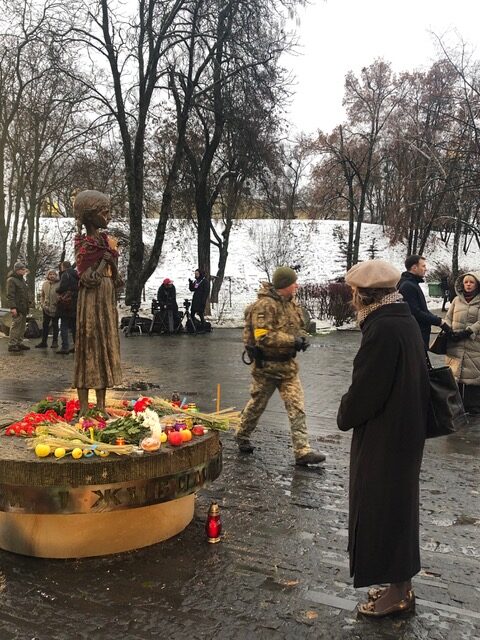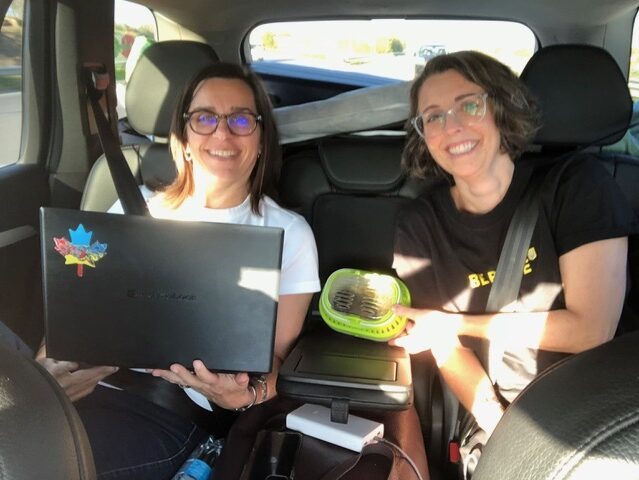Notes from a Wartime Posting: The Hardest Part was Leaving Ukraine

The author paying her respects on Holodmor Memorial Day in Kyiv
By Ashley Mulroney
November 3, 2023
Russia’s full-scale war in Ukraine began for me in the early hours of February 24th, 2022. I was safely in my hotel room in Warsaw. My family was thousands of kilometres away in Canada.
We had known something was coming for months.
I had pleaded with colleagues from the UN and European nations for weeks to take the warnings seriously, to get their families out, to pre-position supplies. Most of these conversations yielded nothing. Many colleagues and organizations were caught on their back foot on February 24th.
And then it started.
For me, war was a call with senior officials in Kyiv, mere days into the war. They were desperate to maintain critical government functions. I and the other donor on the call promised we would do our best. “You are living in another time dimension,” they said, frustrated by our failure to appreciate the existential threat his country was facing. They weren’t wrong.
The war was driving to the airport in Warsaw for the first visit with my family in months. I was on the phone pleading with the head of the International Committee of the Red Cross (ICRC) in Ukraine to send a team to help save a contractor from one of our projects. He and his family had been buried alive in the air raid shelter of their building along with a dozen others. They were still able to communicate by cell phone. I had sent the ICRC photos of the building and its GPS location. “I’m sorry,” he said. “We can’t get to them. The area is occupied by Russian forces and they won’t let anyone through.” The family didn’t make it out alive. International humanitarian law was and remains a casualty in this war – leaving many with no option but to save themselves if they can.
The war was a colleague cracking a joke about his air raid shelter in Lviv being a storage space full of coffins and tombstones for a shop on the building’s main floor. “If something happens to me, at least my family won’t have far to go to look after my final needs,” he said.
The war was spending two days in an air raid bunker in Lviv without power while International Development Minister Harjit Sajjan sat at the border waiting to get into Ukraine. He had been scheduled for a 2.5-day visit, but the start of drone strikes on October 10th, 2022, caused much of Lviv to lose electricity and cell phone communication. We were able to get the minister in for a one-day visit. But first the Ambassador and I celebrated Thanksgiving dinner with cold cuts by candlelight.
When the electricity cuts were at their worst, we procured battery packs for local staff and the Embassy became a refuge of sorts to charge devices and take a shower.
The war meant brainstorming with colleagues about how we could best support the Embassy’s Ukrainian staff, both at the war’s outset and then again later as attacks on electrical infrastructure intensified ahead of the winter. The staff received six months of paid leave at the beginning of the war when the Embassy was closed and later had some time off to prepare for winter. When the electricity cuts were at their worst, we procured battery packs for local staff and the Embassy became a refuge of sorts to charge devices and take a shower. It was a familiar place with familiar faces – no matter how little sleep they’d had the night before.
In the end, Canada committed $416M in development and humanitarian assistance in the first twelve months of the war. The bulk of this was humanitarian funding meant to provide the basics: food, water, and shelter. Among many hundreds of longer-term initiatives, Canada helped rebuild a school and a hospital – to help those communities return to normal. We helped establish the Missing Persons’ Bureau to reunite lost loved ones; we protected millions of metric tons of grain from spoiling; and we provided mental health and psycho-social assistance to hundreds of people affected by the war.
What were my proudest moments? Two stand out above the rest. First, Foreign Affairs Minister Mélanie Joly was able to announce a $120 million loan to the Government of Ukraine during her January 2022 visit to Kyiv. It was the most significant support from any country at the time, it demonstrated Canada’s resolve to stay with Ukraine and it helped to stabilize markets. Months of work lay behind that announcement.

Ashley Mulroney (right), with former Ambassador Larisa Galadza
The second was when, two days into the war, we wrote to our implementing partners authorizing them to use funding normally dedicated to longer-term development programming for humanitarian purposes. We wanted to help them meet the greatest needs in their communities. Some of these partners had decades of experience in Ukraine. All of them had strong networks of local partners across the country and were desperate to do whatever they could. This funding helped people reach safety at the EU border, provided diapers and formula for hungry babies, established a shelter for internally displaced persons in Lviv, and helped move supplies across the country, all before the UN was able to respond to this massive humanitarian crisis. As soon as we issued the letter, we shared it with our donor counterparts and many followed our lead. Over $9.5M was allocated in this way by Canadian partners in the first two months of the war. It’s the best money I’ve ever seen spent on behalf of Canadian taxpayers.
My relationship with Russia goes back over 30 years. I first visited in 1990, studied Russian and had my first posting at our Embassy in Moscow. But by the time Russia first invaded Ukraine in 2014, I saw just how naïve I had been. They made their goals and methods clear for all the world to see in the South Caucasus and in Syria. And now Ukraine was the target.
The hardest part of the war was not the long hours or worrying about friends and colleagues. The hardest part was having to leave when my assignment came to an end.
Russia was now seeking to destroy this country I had grown to love. This place with such deep ties to Canada, where Canadian support had helped achieve important progress in the agricultural sector, judicial reform, gender equality and much more. We had built a grain elevator and established shelters for survivors of gender-based violence. We helped streamline and improve government services in a one-stop-shop modelled on Service Ontario. How could this peaceful country, where progress towards Europe and the West was being achieved daily, be the target of such horrendous violence?
So, my team and I did the only thing we knew how to do – we worked day and night. We helped evacuate colleagues and friends, we directed funding to organizations still operating on the ground, we brainstormed how best to support our partner organizations, and we found creative solutions to help the Ukrainian government in their most desperate moment of need.
The hardest part of the war was not the long hours or worrying about friends and colleagues. The hardest part was having to leave when my assignment came to an end. In no other job have I seen greater impact from Canada’s international assistance. In no other country could I have such frank and productive conversations with government counterparts. And in no other country have I had to walk away while a war was still raging. I am only grateful to have had the chance to contribute to supporting Ukraine in this most trying of times.
The key for me is that Canadians know the war is not over. Villages and towns near the front line are being shelled every day. Hundreds of thousands of Ukrainian children have not been home since the war began. Tens of thousands have been kidnapped by Russia. The tally of damage to homes, schools and hospitals is in the hundreds of billions.
Canada and Canadians cannot continue living in another time dimension. We must keep our eyes open to the horror of the war, recognize the war’s impact across the globe, continue supporting Ukraine with what it needs now – weapons and aid – and be there when it is time to rebuild. Until there are victory parades across Ukraine, we must each of us do what we can to bring this war to an end.
Ashley Mulroney served as Head of International Assistance at Canada’s Embassy to Ukraine from 2019 to 2023, through the COVID pandemic and Russia’s full-scale invasion. She has been posted in Russia, Kenya and South Africa. She began her posting in Ethiopia as the Senior Director of International Assistance in August 2023.
